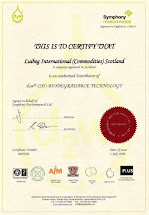Times of India
26 Sep 12
No Blanket Ban on
Plastic
BANGALORE: Going
the Delhi way by putting a blanket ban on its manufacture, sale, storage and
use is not the solution to
tackle the plastic menace, asserted Karnakata State Pollution Control Board
(KSPCB) chairman Vaman Acharya.
"We will
instead put in place segregation units, either automatic or semi-automatic,
where plastic can be recycled and converted into good alternative fuel for
stationary engines," he said.
For this, the
board is in talks with some entrepreneurs who are running these plants quite successfally.
"The idea is to create value for all used-varieties of plastic and making
segregated plastic a source of income for these entrepreneurs” said Aeharya.
To be run in a few
units, these plants will concert the heterogeneous heap of waste into a less
heavy liquid form which will be homogeneous in nature.
"Mature
technology is available in the city. The need is to first ensure that plastic
is segregated and made into something useful. Later we can look at improving
the quality of the manufactured fuel," said Aeharya.
and made into
something useful. Later we can look at improving the quality of the
manufactured fuel," said Aeharya.
KSPCB logic
Given that
chappals, tyres, broken furniture, bottles and cloth material like nylon and
polyester also comprise plastic, KSPCB chief Aeharya said it is difficult to
impose a total ban on plastic.
Even if there is
organic waste thrown in a plastic bag, it defeats the purpose of segregation.
Significantly, BBMP has said that the pourkarmikas will refuse to take the
organic waste put inside a plastic bag. The mandate makes it essential for
citizens to empty the contents of the plastic bag into the waste pushcarts.
KSPCB, however, is
considering the viability of banning plastic up to 40 microns. Currently, the
ban is on plastic of 20 microns or less thickness. Thicker plastics are more
environment-friendly than the thin ones for many reasons. Thin plastic bags are
quite affordable compared to the thicker ones and are therefore not reused
much. Recycling the same is quite difficult given that at least 2OO-odd plastic
bags need to be collected to make it one kilogram (one of the reasons why ragpickers
avoid picking them up too). Also, by virtue of being light-weight, these
plastic bags disintegrate fast, thereby polluting the environment.



No comments:
Post a Comment